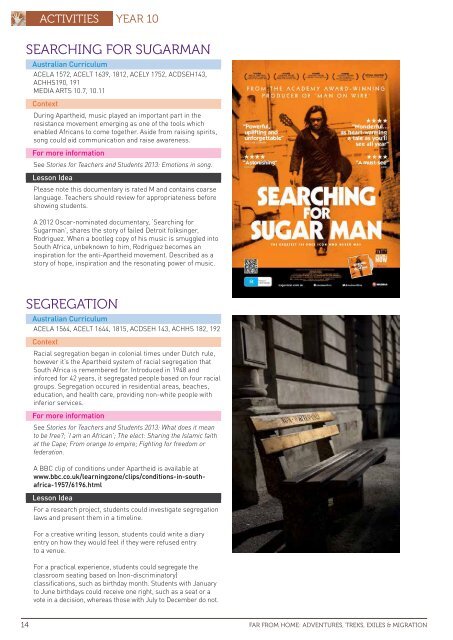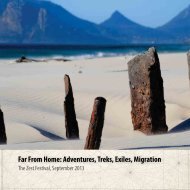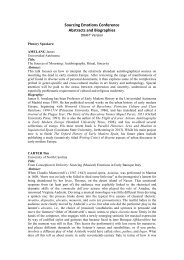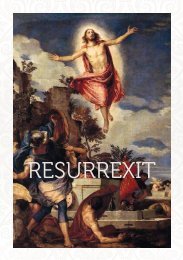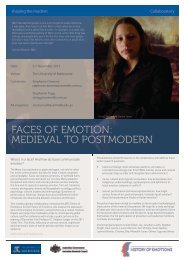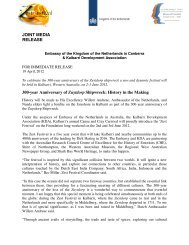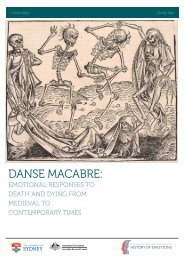Download our K-12 education pack - ARC Centre of Excellence for ...
Download our K-12 education pack - ARC Centre of Excellence for ...
Download our K-12 education pack - ARC Centre of Excellence for ...
You also want an ePaper? Increase the reach of your titles
YUMPU automatically turns print PDFs into web optimized ePapers that Google loves.
ACTIVITIES Year 10<br />
Searching <strong>for</strong> Sugarman<br />
Australian Curriculum<br />
ACELA 1572, ACELT 1639, 18<strong>12</strong>, ACELY 1752, ACDSEH143,<br />
ACHHS190, 191<br />
MEDIA ARTS 10.7, 10.11<br />
Context<br />
During Apartheid, music played an important part in the<br />
resistance movement emerging as one <strong>of</strong> the tools which<br />
enabled Africans to come together. Aside from raising spirits,<br />
song could aid communication and raise awareness.<br />
For more in<strong>for</strong>mation<br />
See Stories <strong>for</strong> Teachers and Students 2013: Emotions in song.<br />
Lesson Idea<br />
Please note this documentary is rated M and contains coarse<br />
language. Teachers should review <strong>for</strong> appropriateness be<strong>for</strong>e<br />
showing students.<br />
A 20<strong>12</strong> Oscar-nominated documentary, ‘Searching <strong>for</strong><br />
Sugarman’, shares the story <strong>of</strong> failed Detroit folksinger,<br />
Rodriguez. When a bootleg copy <strong>of</strong> his music is smuggled into<br />
South Africa, unbeknown to him, Rodriguez becomes an<br />
inspiration <strong>for</strong> the anti-Apartheid movement. Described as a<br />
story <strong>of</strong> hope, inspiration and the resonating power <strong>of</strong> music.<br />
Segregation<br />
Australian Curriculum<br />
ACELA 1564, ACELT 1644, 1815, ACDSEH 143, ACHHS 182, 192<br />
Context<br />
Racial segregation began in colonial times under Dutch rule,<br />
however it’s the Apartheid system <strong>of</strong> racial segregation that<br />
South Africa is remembered <strong>for</strong>. Introduced in 1948 and<br />
in<strong>for</strong>ced <strong>for</strong> 42 years, it segregated people based on f<strong>our</strong> racial<br />
groups. Segregation occured in residential areas, beaches,<br />
<strong>education</strong>, and health care, providing non-white people with<br />
inferior services.<br />
For more in<strong>for</strong>mation<br />
See Stories <strong>for</strong> Teachers and Students 2013: What does it mean<br />
to be free; ‘I am an African’; The elect: Sharing the Islamic faith<br />
at the Cape; From orange to empire; Fighting <strong>for</strong> freedom or<br />
federation.<br />
A BBC clip <strong>of</strong> conditions under Apartheid is available at<br />
www.bbc.co.uk/learningzone/clips/conditions-in-southafrica-1957/6196.html<br />
Lesson Idea<br />
For a research project, students could investigate segregation<br />
laws and present them in a timeline.<br />
For a creative writing lesson, students could write a diary<br />
entry on how they would feel if they were refused entry<br />
to a venue.<br />
For a practical experience, students could segregate the<br />
classroom seating based on (non-discriminatory)<br />
classifications, such as birthday month. Students with January<br />
to June birthdays could receive one right, such as a seat or a<br />
vote in a decision, whereas those with July to December do not.<br />
14 FAR FROM HOME: ADVENTURES, TREKS, EXILES & MIGRATION


